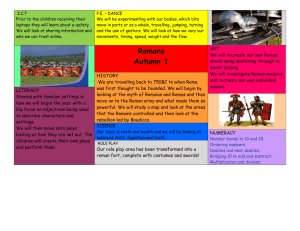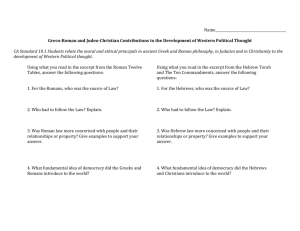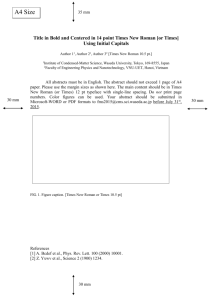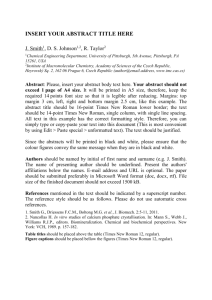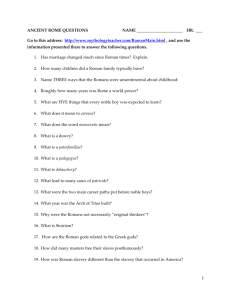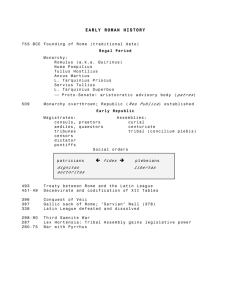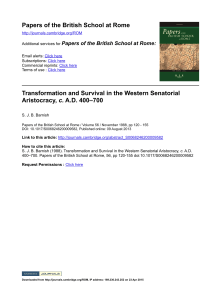Western Civ: Chapter 2 Online Questions
advertisement
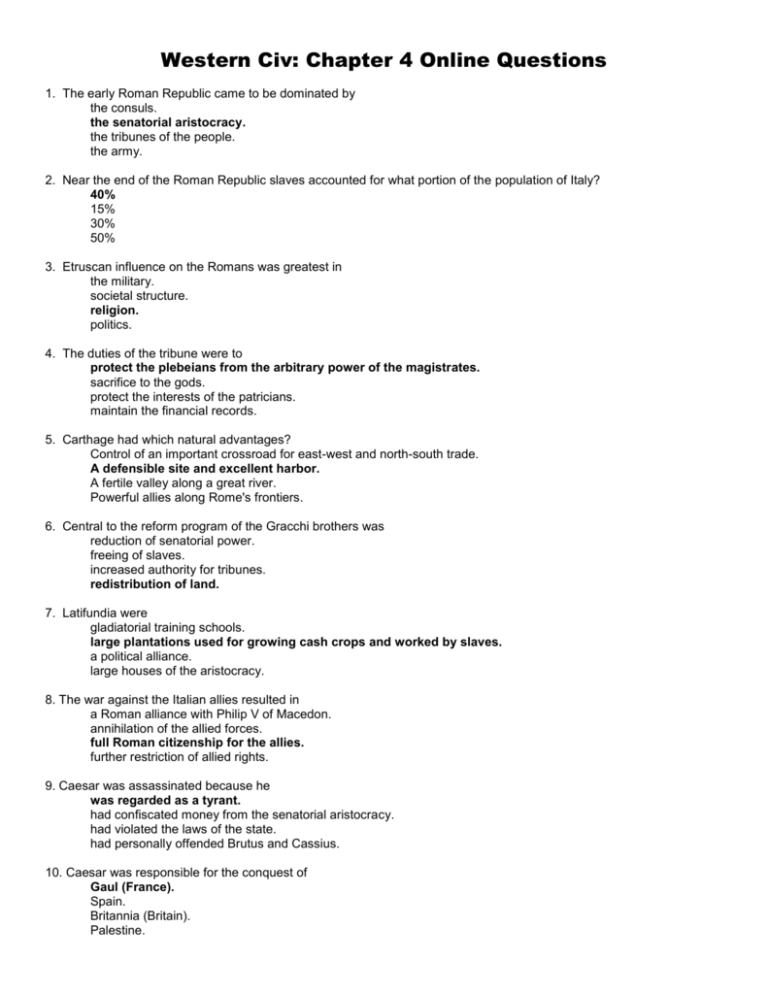
Western Civ: Chapter 4 Online Questions 1. The early Roman Republic came to be dominated by the consuls. the senatorial aristocracy. the tribunes of the people. the army. 2. Near the end of the Roman Republic slaves accounted for what portion of the population of Italy? 40% 15% 30% 50% 3. Etruscan influence on the Romans was greatest in the military. societal structure. religion. politics. 4. The duties of the tribune were to protect the plebeians from the arbitrary power of the magistrates. sacrifice to the gods. protect the interests of the patricians. maintain the financial records. 5. Carthage had which natural advantages? Control of an important crossroad for east-west and north-south trade. A defensible site and excellent harbor. A fertile valley along a great river. Powerful allies along Rome's frontiers. 6. Central to the reform program of the Gracchi brothers was reduction of senatorial power. freeing of slaves. increased authority for tribunes. redistribution of land. 7. Latifundia were gladiatorial training schools. large plantations used for growing cash crops and worked by slaves. a political alliance. large houses of the aristocracy. 8. The war against the Italian allies resulted in a Roman alliance with Philip V of Macedon. annihilation of the allied forces. full Roman citizenship for the allies. further restriction of allied rights. 9. Caesar was assassinated because he was regarded as a tyrant. had confiscated money from the senatorial aristocracy. had violated the laws of the state. had personally offended Brutus and Cassius. 10. Caesar was responsible for the conquest of Gaul (France). Spain. Britannia (Britain). Palestine. 1. If the client provided his patron with political and military support, the patron provided physical and legal protection. FALSE TRUE 6. As the Romans increased their role in the Mediterranean world, it became clear to them that military campaigns would be very costly. TRUE FALSE 2. Pompey and Caesar defeated the slave revolt led by Spartacus. TRUE FALSE 7. Originally, Carthage in North Africa was a Greek colony. FALSE TRUE 3. The tactics of Quintus Fabius Maximus were designed to force Hannibal to battle. TRUE FALSE 8. Among his many internal reforms, Caesar reduced the number of Roman senators. TRUE FALSE 4. Hannibal planned to defeat Rome by a direct assault on the city itself. TRUE FALSE 9. After the Second Punic War against Carthage, much of Rome's farmland was reorganized into large estates called imperiums. FALSE TRUE 5. Many volunteers for the Roman legions viewed enlistment as an opportunity to obtain land and other rewards in exchange for their service. FALSE TRUE 10. The center of Roman life was the family. FALSE TRUE 1. The Etruscan civilization arose in Etruria about 800 B.C.E. and exerted the most powerful external influence on the Romans. 2. With the end of the monarchy, the Senate became the single continuous deliberative body in the Roman state, greatly increasing its influence and power. 3. The plebeians undertook a campaign to achieve political, legal, and social equality, and this attempt, which succeeded after two centuries of intermittent effort, is call the Struggle of the Orders. 4. The conquest of southern Italy brought the Romans face to face with the great naval power of the western Mediterranean, Carthage. 5. A rebellion in Sicily in 134 B.C.E. kept the island in turmoil for more than two years, and the rebellion of the gladiators led by Spartacus in 73 B.C.E. produced an army of seventy thousand slaves that repeatedly defeated the Roman legions and overran all of southern Italy before it was brutally crushed. 6. Gaius broke new ground in appealing to the equestrian order in his struggle against the Senate. 7. When Pompey returned to Rome in 62 B.C.E, he had more power, prestige, and popular support than any Roman in history. 8. Ceasar, Crassus and Pompey formed the First Triumvirate, an informal agreement among three Roman politicians, each seeking his private goals, which further undermined the future of the republic. 9. On March 15, 44 B.C.E, Caesar entered the Senate, characteristically without a bodyguard, and was stabbed to death. 10. Octavian/Octavius, Mark Antony, and M. Aemilius Lepidus formed the Second Triumvirate which, unlike the First, was legally empowered to rule almost dictatorially.


